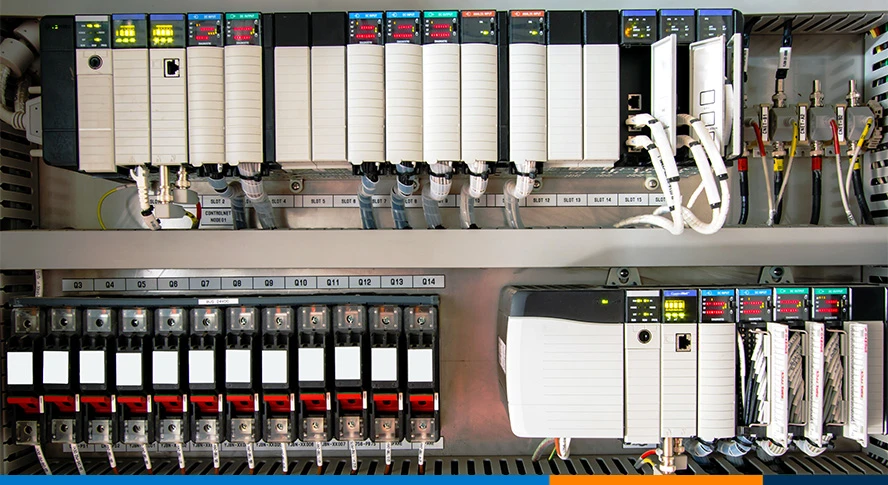Programmable Logic Controllers (PLCs) have become a core component in industrial automation, driving efficiency, precision, and reliability across various industries. These systems offer versatile control over complex machinery and processes, making them indispensable for modern manufacturing environments. In this article, we’ll look at how PLC systems are reshaping industrial automation, what makes them essential, and how businesses can leverage their power.
What Are PLC Systems?
PLC systems are specialized computers used to control manufacturing processes, machinery, and other automated operations. These devices are designed to handle the complexities of industrial environments, including temperature fluctuations, dust, and humidity, while offering precise control over processes that range from simple machine automation to large-scale factory operations.
They are typically programmed using a standard language such as ladder logic, making them user-friendly for engineers and operators. Due to their flexibility, they can be easily modified to fit new production requirements, which is a major advantage for dynamic industries.
Why Are PLC Systems Important for Industrial Automation?
1. Reliability and Durability
One of the most crucial benefits of PLC systems is their reliability. They are built to endure harsh industrial environments and run continuously for extended periods without failure. This reliability is critical for industries like manufacturing, where downtime can result in substantial financial losses.
2. Flexibility in Programming
PLC systems offer flexibility through easy-to-use programming languages that allow businesses to tailor them to specific operations. Whether it’s controlling an assembly line or monitoring a complex chemical process, a PLC can be adapted to almost any requirement. The systems can also be reprogrammed as necessary, providing businesses with the agility to adjust operations without replacing hardware.
3. Precision and Speed
In many industries, precision and speed are critical. PLC systems excel in both areas, providing real-time data and immediate response to process changes. This allows operators to monitor production closely and make adjustments on the fly, ensuring consistency and quality across operations.
4. Scalability
Another major benefit of PLC systems is their scalability. These systems can control everything from small, individual machines to entire production lines and factories. As a business grows, so can the capabilities of its PLC systems. PLC Systems provide scalable solutions for industries, allowing for easy expansion without a complete overhaul of the system.
Applications of PLC Systems in Industry
PLC systems have wide-ranging applications across various sectors. Let’s look at some industries where PLCs are making a significant impact:
1. Manufacturing
In the manufacturing sector, PLC systems control everything from assembly lines to robotic arms. They help in automating repetitive tasks, increasing productivity while maintaining high-quality standards. In many cases, PLCs work alongside other automation systems, such as sensors and actuators, to ensure the seamless operation of the entire process.
2. Food and Beverage
For industries that require strict adherence to hygiene and quality standards, such as food and beverage production, PLC systems provide the control necessary to maintain these standards. Whether it’s monitoring temperatures, controlling batch production, or managing conveyor belts, PLCs ensure that the process runs smoothly and efficiently.
3. Oil and Gas
The oil and gas industry involves hazardous conditions and requires precise control of processes. PLC systems are used to monitor and control drilling operations, refinery processes, and pipeline systems. With their ability to withstand harsh environments and offer real-time control, PLCs play a vital role in ensuring the safety and efficiency of operations.
4. Automotive
In the automotive industry, PLC systems are used to automate assembly lines, control welding machines, and even assist in quality inspections. By providing accurate and timely control over various manufacturing processes, PLC systems contribute to higher output and reduced error rates in vehicle production.
Advantages of Implementing PLC Systems
1. Reduced Human Error
Automation significantly reduces the chances of human error in industrial operations. PLC systems can execute tasks with unparalleled precision, making them ideal for industries where even a slight deviation from the norm can result in defects or safety issues.
2. Cost Efficiency
While the initial setup costs of a PLC system may be high, the long-term savings are significant. These systems are designed to run continuously with minimal maintenance. They reduce the need for human labor, lower operational errors, and increase productivity—all of which contribute to cost savings.
3. Improved Safety
In industries with hazardous working conditions, PLC systems play a crucial role in improving safety. They allow operators to control machinery and processes remotely, reducing the need for direct human intervention. In case of an emergency, PLCs can also be programmed to execute automatic shutdown procedures, preventing accidents and protecting workers.
4. Real-Time Monitoring and Data Collection
Modern PLC systems offer real-time monitoring and data collection capabilities. This feature allows businesses to track operational efficiency, identify areas for improvement, and maintain a detailed log of production data for analysis. This data-driven approach enables informed decision-making and continuous optimization of processes.
Challenges and Future Prospects for PLC Systems
While PLC systems offer numerous benefits, they are not without challenges. One of the main hurdles is the high initial cost of implementation, particularly for small and medium-sized businesses. Additionally, skilled personnel are required to program and maintain these systems, which can be a barrier for companies with limited technical expertise.
However, the future of PLC systems looks promising as technology continues to evolve. With the integration of IoT (Internet of Things) and advancements in AI (Artificial Intelligence), PLC systems are expected to become even more powerful and versatile. These advancements will likely drive further automation and efficiency across industries, making PLCs a central component of the future of industrial automation.
Conclusion
PLC systems have become the backbone of industrial automation, offering reliable, flexible, and scalable solutions for a wide range of industries. From manufacturing to oil and gas, these systems have proven their value in improving efficiency, reducing costs, and enhancing safety. As businesses continue to adopt more advanced technologies, PLC systems will remain an integral part of industrial operations, driving innovation and performance.



